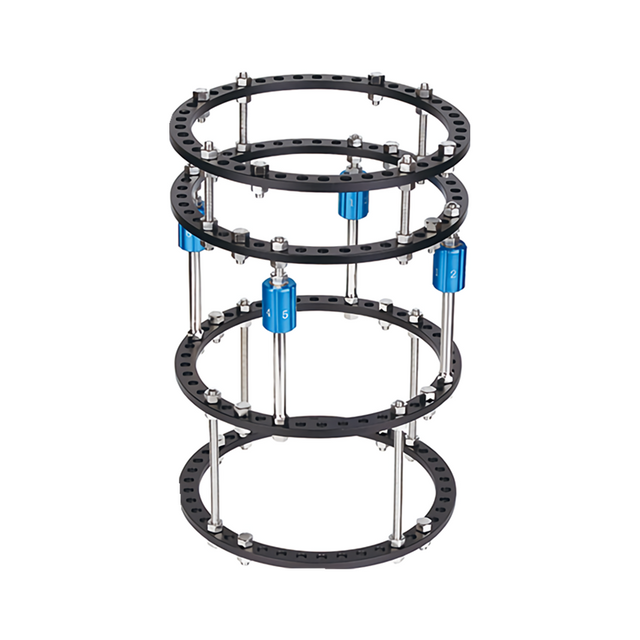What is external fixation?
External fixation is a method of stabilizing fractures or correcting skeletal deformities by using metal implants that are positioned outside the body and anchored to the bone with pins or wires.
It involves placing metal pins, screws, or wires into the bone on both sides of the fracture or deformity and then connecting them to a metal bar or frame outside the body. The pins or wires can be adjusted to align the bone and hold it in place as it heals.
External fixation can also be used for limb lengthening, treating infections or non-unions, and correcting bone deformities.
It is often used in cases where traditional methods of internal fixation, such as plates and screws, may not be possible or appropriate.
What are the types of external fixators?
There are several types of external fixators, including:
Unilateral fixators: These are used to stabilize fractures or correct deformities in the arms or legs. They consist of two pins or wires inserted into the bone on one side of the limb, which are connected to an external frame.
Circular fixators: These are used to treat complex fractures, limb length discrepancies, and bone infections. They consist of multiple rings that are connected by struts, which are secured to the bone using wires or pins.
Hybrid fixators: These are a combination of unilateral and circular fixators. They can be used to treat complex fractures and bone deformities.
Ilizarov fixators: These are a type of circular fixator that uses thin wires or pins to secure the bone. They are often used to treat complex fractures, limb length discrepancies, and bone infections.
Hexapod fixators: These are a type of circular fixator that uses computer software to adjust the frame and correct the position of the bone. They are often used to treat complex fractures and bone deformities.
The type of external fixator used depends on the specific condition being treated and the preference of the surgeon.
How long do I have to wear the external fixator?
The length of time that a patient needs to wear an external fixator depends on several factors, including the type of injury being treated, the severity of the injury, and the rate of healing.
In some cases, the fixator may need to be worn for several months, while in other cases, it may be removed after only a few weeks.
Your doctor will be able to give you a better estimate of how long you will need to wear the fixator based on your specific condition and the progress of your healing.
Can an external fixator walk?
It is possible to walk with an external fixator, depending on the location of the fixator and the severity of the injury.
However, it may take some time to adjust to walking with the fixator and it is important to follow the advice and instructions of your doctor or physical therapist to avoid putting too much weight on the affected area.
In some cases, crutches or other mobility aids may be necessary to assist with walking.
How External Fixators Work?
External fixators are medical devices used in orthopedic surgeries to stabilize and immobilize bone fractures or dislocations. They are used to support the healing process of bone injuries and can be applied either before or after a surgical procedure. External fixators consist of metal pins or screws that are inserted into the bone fragments, and then connected to a frame with metal rods and clamps that are positioned outside of the body.
The frame creates a rigid structure that stabilizes the affected bone fragments and allows for accurate alignment of the fracture site, which promotes proper healing. The external fixator also allows for a degree of adjustability, as the pins and clamps can be adjusted to reposition the bones as they heal. The device works by transferring the weight and stress of the body to the external frame, rather than the injured bone, which reduces pain and promotes healing.
External fixators are typically worn for several weeks to several months, depending on the severity of the injury and the healing process of the individual. During this time, patients may experience some discomfort and limitations in their mobility, but they can still perform some daily activities and exercises as directed by their healthcare provider.
What are the most common complications of external fixators?
Some common complications of external fixators include:
Pin site infections: External fixators use metal pins or wires that penetrate the skin to hold the device in place. These pins can sometimes become infected, leading to redness, swelling, and pain around the site.
Pin loosening or breakage: Pins may loosen or break over time, which can lead to the device becoming less stable.
Malalignment: Improper placement or adjustment of the fixator can lead to malalignment of the bones, resulting in a poor outcome.
Joint stiffness: External fixators can limit joint movement, leading to stiffness and reduced range of motion.
Nerve or blood vessel injury: If the pins or wires of the external fixator are not placed correctly, they can damage nearby nerves or blood vessels.
Pin tract fractures: Repeated stress on the pins can cause the bone around the pin to weaken, leading to a pin tract fracture.
It's important to closely monitor external fixators and report any concerning symptoms to your healthcare provider to prevent and manage these complications.
How to Buy High Quality External Fixators?
To buy high quality external fixators, you should consider the following factors:
Manufacturer: Choose a reputable manufacturer with a good track record in producing high quality external fixators.
Material: Look for external fixators made from high-quality materials such as titanium, stainless steel, or carbon fiber.
Design: The design of the external fixator should be appropriate for the specific injury or condition it will be used to treat.
Size: Ensure that you select the appropriate size of external fixator for the patient's body size and the injured area.
Accessories: Check to ensure that the external fixator comes with all the necessary accessories, such as pins, clamps, and wrenches.
Sterility: External fixators should be sterile to prevent infection, so make sure they are packaged and delivered in sterile conditions.
Cost: While cost should not be the only consideration, it is important to balance the quality and features of the external fixator with the price.
Consultation: It is advisable to consult with a qualified medical professional to help you choose the most appropriate external fixator for your needs.
CZMEDITECH is a medical device company that specializes in the production and sale of high-quality orthopedic implants and instruments, including surgical power tools. The company has over 14 years of experience in the industry and is known for its commitment to innovation, quality, and customer service.
When purchasing external fixators from CZMEDITECH, customers can expect products that meet international standards for quality and safety, such as ISO 13485 and CE certification. The company uses advanced manufacturing technologies and strict quality control processes to ensure that all products are of the highest quality and meet the needs of surgeons and patients.
In addition to its high-quality products, CZMEDITECH is also known for its excellent customer service. The company has a team of experienced sales representatives who can provide guidance and support to customers throughout the purchasing process. CZMEDITECH also offers comprehensive after-sales service, including technical support and product training.
English
Français
Русский
Español
العربية
Português
Deutsch
italiano
日本語
한국어
Nederlands
Tiếng Việt
ไทย
Polski
Türkçe
አማርኛ
ພາສາລາວ
ភាសាខ្មែរ
Bahasa Melayu
ဗမာစာ
தமிழ்
Filipino
Bahasa Indonesia
magyar
Română
Čeština
Монгол
қазақ
Српски
हिन्दी
فارسی
Kiswahili
Slovenčina
Slovenščina
Norsk
Svenska
українська
Ελληνικά
Suomi
Հայերեն
עברית
Latine
Dansk
اردو
Shqip
বাংলা
Hrvatski
Afrikaans
Gaeilge
Eesti keel
Māori
नेपाली
Oʻzbekcha
latviešu
অসমীয়া
Aymara
Azərbaycan dili
Bamanankan
Euskara
Беларуская мова
भोजपुरी
Bosanski
Български
Català
Cebuano
Corsu
ދިވެހި
डोग्रिड ने दी
Esperanto
Eʋegbe
Frysk
Galego
ქართული
guarani
ગુજરાતી
Kreyòl ayisyen
Hausa
ʻŌlelo Hawaiʻi
Hmoob
íslenska
Igbo
Ilocano
Basa Jawa
ಕನ್ನಡ
Kinyarwanda
गोंगेन हें नांव
Krio we dɛn kɔl Krio
Kurdî
Kurdî
Кыргызча
Lingala
Lietuvių
Oluganda
Lëtzebuergesch
Македонски
मैथिली
Malagasy
മലയാളം
Malti
मराठी
ꯃꯦꯇꯥꯏ (ꯃꯅꯤꯄꯨꯔꯤ) ꯴.
Mizo tawng
Chichewa
ଓଡ଼ିଆ
Afaan Oromoo
پښتو
ਪੰਜਾਬੀ
Runasimi
Gagana Samoa
संस्कृत
Gaelo Albannach
Sepeti
Sesotho
chiShona
سنڌي
Soomaali
Basa Sunda
Wikang Tagalog
Тоҷикӣ
Татарча
తెలుగు
ትግንያውያን
Xitsonga
Türkmençe
संस्कृत
ئۇيغۇرچە
Cymraeg
isiXhosa
ייִדיש
Yorùbá
isiZulu









